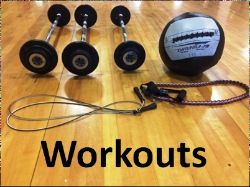Article of the Day: Do Negative Calorie Foods Really Exist? Many people say that eating celery can help you lose weight because it takes more energy to digest than it contains. But is that really true?? Check out this article for the truth on this commonly asked weight loss question!
We have all been told over and over that keeping a food journal can be our best ally in the battle of the bulge. I will admit that even though I know it is good for me, I often fall of track and stop logging my food for a few days or even weeks. (yikes bad bad me!) But I am determined to stick with it for the long haul this time. I have my super cute journal and I am ready to go!
Top 12 reasons to keep a food journal:
- Helps keep track of food intake (main purpose).
- Holds you accountable.
- Assists in developing an accurate picture of factors contributing to weight gain or preventing weight loss.
- Enables you to monitor calorie intake.
- Encourages focus on food choices, makes eating a mindful, conscious activity and not mindless or unconscious.
- Creates a record to monitor progress or failure.
- Helps control binges.
- Encourages development of new eating habits
- Reinforces commitment to weight loss goals, changing eating habits and improving diet.
- Helps identify problem eating times, food triggers, types of foods and foods used for comfort.
- Documents the relationship between food and mood.
- Helps identify where, when and why you are eating.
What to Track:
- What you ate
- How much you consumed
- When you ate
- Where you were while eating
- How you felt before, during and after you ate
- Include the small details: Include even the small details in your food diary such as the extra topping, extra cheese, or a candy etc. This will help you to realize and avoid the foods which add extra calories
- Track as you go. Don’t wait until the end of the day to write down what you ate.
- Keep reviewing: Keep reviewing your food diary. This will help you to know your eating habits and set new goals to lose weight
- Watch the portion size: Watch the amount of food you eat. Using measuring scales or cups at home can help you learn to recognize portion sizes. Check out Portion Distortion for help with correct portion sizes.
- Don’t Skip indulgent days. I know we don’t want to admit to ourselves that we fell off the wagon, but don’t skip over your journal on an indulgent day. Tracking what you indulge in can help you recognize emotional and environmental triggers.
Yours truly,
Lauren G.
share this on » |




















